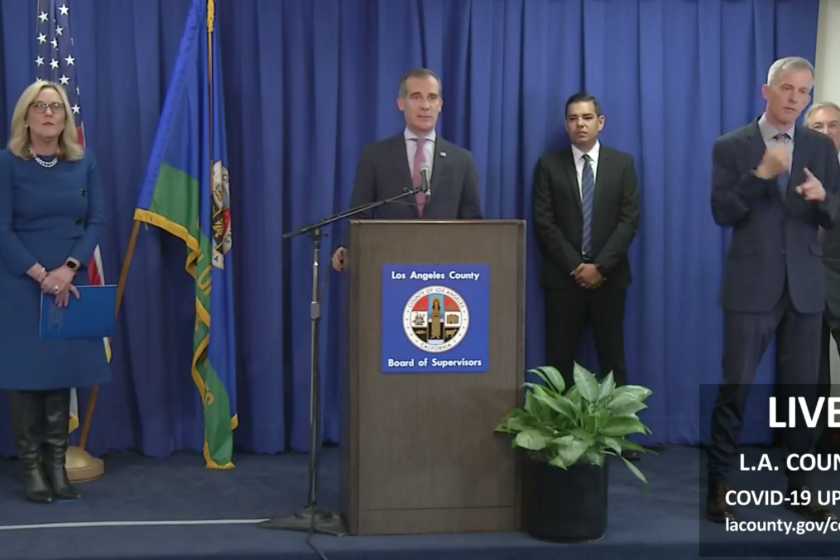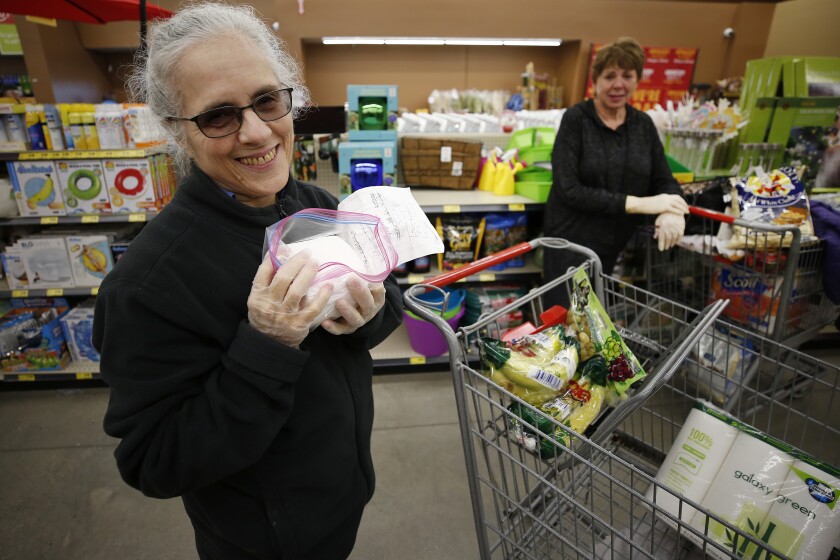Garcetti said residents should leave home only for essential activities and needs, including getting food; caring for a relative, friend or child; getting necessary healthcare; or going for a walk in the neighborhood.
“Nobody is locked down, and we encourage you not to be locked,” Garcetti said. “This is not ‘shelter in place’ like a school shooting, this is stay at home because you’re safer at home. And the only people who should be leaving home and going out are those whose jobs are critical to the safety, the health and security of the city, as well as the economy of recovery for us and the nation during this crisis.”
Here is what you can do and can’t do under L.A.'s new coronavirus health orders
1 hour ago
Essential businesses include grocery stores, food banks and outdoor farmers markets; schools and child care; businesses that provide food, shelter, social services and other necessities of life for economically disadvantaged people; gas stations; banks and financial institutions; hardware stores; plumbers and electricians; healthcare operators and facilities; transportation services; and residential facilities.
But these businesses must comply with the order’s social distancing and hygiene requirements, including providing access to hand-washing facilities with soap and water or with hand sanitizer that contains at least 60% alcohol.
Barbara Ferrer, director of the L.A. County Department of Public Health, said at Thursday evening’s news conference that there is the potential for “many, many people” to become infected in a county of more than 10 million people.
“We must slow the number of new cases we have — we must,” Ferrer said. “Without slowing the number of new cases, we will for sure overwhelm not only our healthcare system” but also other essential services.
Under the city’s order, officials said, residents are permitted to:
- Go to the grocery store;
- Go to the pharmacy to pick up medications and other healthcare necessities;
- Go to medical appointments (check with your doctor or provider first);
- Take a walk, ride your bike and be in nature for exercise — just keep at least six feet between you and others in the community;
- Walk your pets and take them to the veterinarian if necessary;
- Help someone to get necessary supplies.
Residents are not allowed to:
- Go to work unless providing essential services as defined by the order;
- Visit friends and family if there is no urgent need;
- Maintain less than six feet of distance from others when you go out;
- Travel to or from a job outside the city, unless to perform essential activities;
- Travel to or from a vacation home outside the city;
- Visit loved ones in a hospital, nursing home, skilled nursing facility or other residential care facility.
These are considered essential services:
- City/county government services
- Healthcare providers
- Food and grocery service
- Hardware stores and nurseries
- Plumbers, electricians, exterminators, custodial/janitorial workers, handyman services, funeral home workers and morticians, moving services, HVAC installers, carpenters, landscapers, gardeners, property managers, private security personnel and others who provide services to maintain the safety, sanitation and essential operation of properties and other essential activities
- Banks
- Organizations and businesses that provide food, shelter, social services and other necessities of life for economically disadvantaged or otherwise needy individuals (including gang prevention and intervention and domestic violence agencies)
- Laundromats/laundry service
- Newspapers, magazines, television, radio, podcasts and other media services
- Educational institutions, including public and private K-12 schools, colleges, and universities — for purposes of facilitating distance learning or performing essential functions provided that social distancing of six feet per person is maintained to the greatest extent possible
The county order prohibits all indoor public and private gatherings and all outdoor public and private events within a confined space, where at least 10 people are expected to be in attendance at the same time.
Additionally, anyone who organizes a gathering of up to nine people must ensure guests practice social distancing, staying at least six feet apart. Organizers also must post signs near the gathering’s entryway that tell people not to attend if they’re sick. It’s also required that guests have access to either soap and water to wash their hands or hand sanitizer that contains at least 60% alcohol.
“This latest order enforces a simple fact: With this disease spreading, you are safer at home,” L.A. County Supervisor Janice Hahn said in a statement. “Everyone can still get the food and supplies they need — but by staying at home right now, you are not only keeping yourself as safe as possible, you are helping make it safer for the grocery store workers, healthcare workers, first responders and transit workers we are depending on to be in public.”
At the news conference, the cities of Long Beach and Pasadena released similar orders.
Long Beach Mayor Robert Garcia urged residents to follow the public health orders, which are effective at 11:59 p.m. Thursday and remain in effect until April 19.
“This is a serious step, and I think all of us realize we are in a serious health crisis,” Garcia said.
Shortly after the announcement, Gov. Gavin Newsom ordered all Californians to stay at home, marking the first mandatory restrictions placed on the lives of all 40 million residents in the state’s fight against the novel coronavirus.
L.A. County sees increase in cases
A man with an underlying medical condition became the second person to die of the coronavirus in Los Angeles County, officials announced Thursday, and the total number of confirmed cases rose by 40 overnight to 230.
The man who died was between 30 and 50 years old, county health officials said at a news conference.
Two of the new cases are in Long Beach, which now has 12 confirmed cases, the Long Beach Public Health Department said. Three people there have recovered from the virus and 130 people are being monitored, officials said.
Laboratory testing for the coronavirus is increasing but remains limited, Ferrer said. Seven labs are serving the county, and they have multiple sites where they are testing specimens, she said.
Almost 1,700 people had been tested in L.A. County as of Wednesday, Ferrer said. Of those people tested through the county Public Health Laboratory, about 21% have tested positive. Of those tested through commercial labs, about 10% have tested positive, she said.
As she announced the new cases, Ferrer urged residents to get serious about limiting contact with others.
“Because COVID-19 is widespread, as a general rule of thumb, you should assume that you may be infected and that others around you may be infected and therefore act accordingly,” she said. “Take every precaution possible to avoid infecting others and avoid becoming infected. That’s the goal of social distancing.”
Make way for Granny: L.A. grocers go 65-plus in pre-dawn hours during coronavirus pandemic
March 19, 2020
Many Californians isolated in their homes have watched as the number of confirmed cases continues to rise daily. As of Thursday evening, the state has at least 1,001 cases and 19 deaths, compared with 157 cases and three deaths the week before. About 12,000 people in the state are self-monitoring for symptoms.
Sacramento County has 45 confirmed cases of COVID-19 and has had three people die of complications from the virus that causes the disease.
San Francisco officials said Thursday that the city is adding 2,500 new shelter spaces for the homeless and 3,500 hotel rooms for people who need to quarantine but have no place to do so. Many of the hotel rooms will go to people who live in single-occupancy hotels with shared bathrooms and kitchens. The amount of new spaces and rooms is based on estimates from public health officials about what will be needed. Those numbers could increase.
San Francisco has about 8,000 homeless people. The city will open “pop up” shelters to ensure social distancing, and isolate homeless individuals who have tested positive but do not require hospitalization, officials said Thursday.
Trent Rhorer, executive director of San Francisco’s Department of Human Services, said the city expects to have leases for 500 rooms by the end of the week, and hotels with more than 2,000 rooms have expressed interest in leasing. He said the city was in the process of securing food and staffing for those in isolation.
In addition to the 3,500 rooms for isolation, the city will lease rooms for first responders.
Curated by: https://www.ParagonHost.net
Est. 1999 | Paragon Host Internet Group | Web, Email, Workspace | Global Hosting Services

